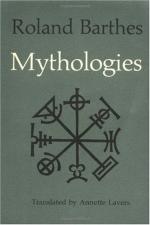|
This section contains 774 words (approx. 2 pages at 400 words per page) |

|
Section 2, Part 5 Summary and Analysis
"Myth as Stolen Language" The author suggests in this section that myth, in its purposeful bestowing of "concept" upon image (linguistic and visual) is, in fact, "language robbery," taking from language its original purpose of straightforward communication. Conversely, he also argues that language by itself is rarely rich enough in meaning to convey meaning's fullest depths. Here he draws a contrast between the use of myth-language and contemporary poetry, which he suggests have opposite intents (in a footnote, he writes that classic poetry uses mythic structure and technique to considerable effect). Myth-language, he writes, transforms meaning into signification, while contemporary poetry attempts to endow signification with meaning. The author suggests, however, that here is another paradox—that in striving so vigorously to avoid mythic techniques and meaning, contemporary (minimalist) poetry is in fact an embodiment of the mythologizing...
(read more from the Section 2, Part 5 Summary)
|
This section contains 774 words (approx. 2 pages at 400 words per page) |

|




